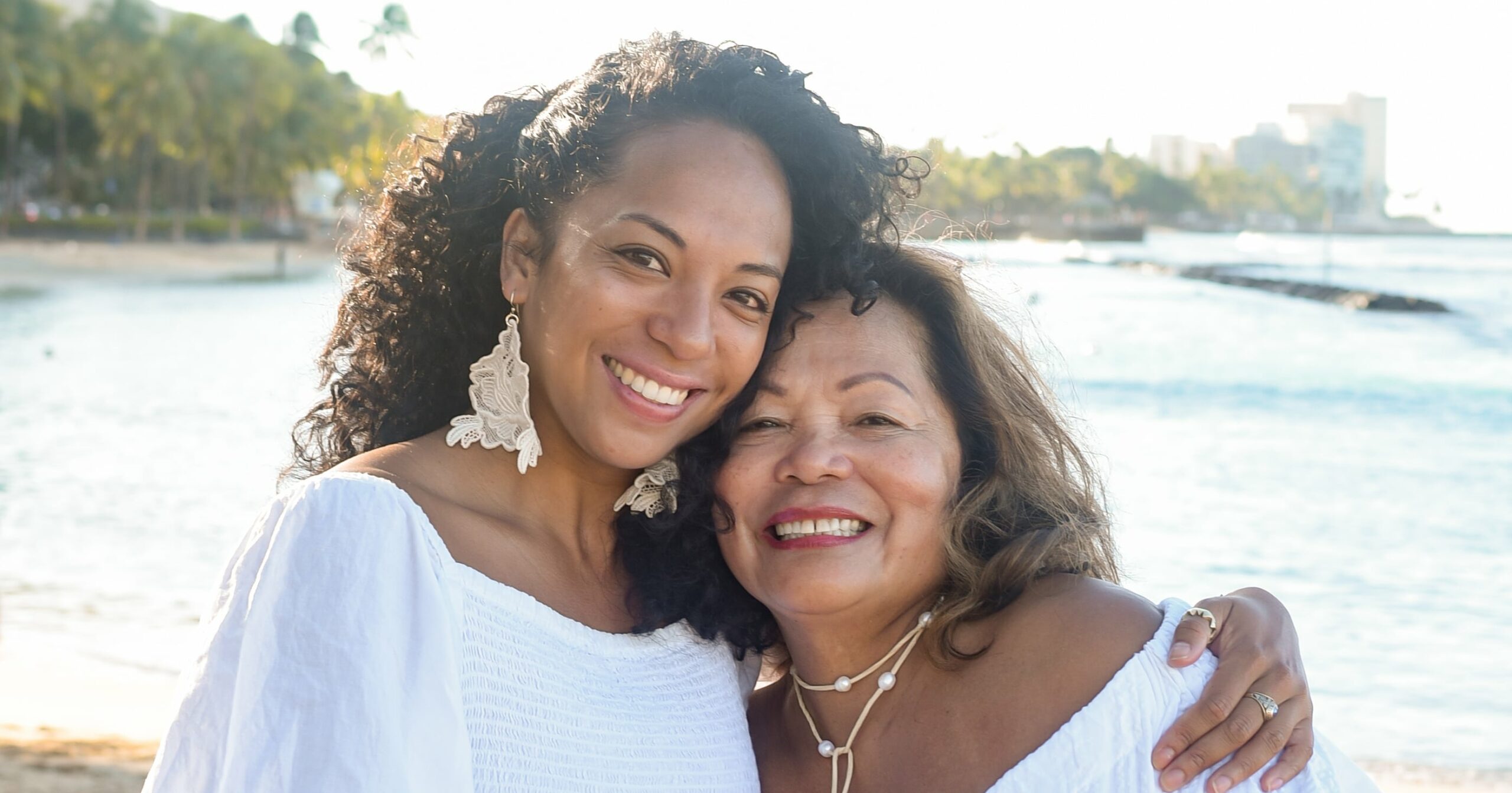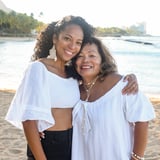Where I’m From: Now and Gen features in-conversation pieces between generations – like a younger woman and her grandmother – discussing topics like beauty rituals, finances, or marriage. We chatted with Berna Anat, a self-proclaimed “financial hype woman” and author of “Money Out Loud,” and her mom, Bema Anat, about money, independence, and financial education. Read their candid conversation below.
Berna Anat began her journey as a financial educator when she noticed the personal finance world was – as she describes it – “hella male, hella pale, hella stale.” As a first-generation Filipina American and “proud” daughter of immigrants, she understood quickly that financial education was made to be inaccessible for folks like her.
Having never discussed finances growing up, reality hit when Berna moved to New York City in her 20s. “None of us were talking about money, but we were all secretly transferring money from our savings into our checking to buy the next round of margaritas,” she says of her and her fellow 20-something friends. She cashed in old savings bonds and “scraped around” to make rent. After a few years, she got a job that would include a move to San Francisco, where she’s originally from – and her first steady paycheck in years – and it was then she realized she needed to get serious about handling her $38,000 in student loan debt and $12,000 of credit card debt.
“The material out there is written by people who do not live like us or look like us.”
“We did not talk about money growing up,” she says. “We did not come from money. I didn’t have a finance background, and no one in my family had a finance background, so I resorted to Google.” But when she searched queries like “how to budget,” “how to create my first savings fund,” and “how to get rid of credit card debt,” she found that the “material out there is written by people who do not live like us or look like us.” That’s when she started investigating and eventually DIY’d her own financial education for folks to confront their own finances, pay down their debt, and invest for their future. This drive came from her mom, Bema Anat, whose own immigrant journey taught her daughter to be fiercely independent.
Ahead, the mother-daughter duo discuss the ways their upbringings affected their view of money, what true wealth looks like to them, and the life lessons they’ve taught each other.
On How Their Upbringings Shaped Their Approach to Money
Berna Anat: As a kid, my parents did a really good job at never making us feel like money was a burden. They didn’t do a lot of discussing money in front of us, which I think had more to do with wanting to protect us. They both immigrated from the Philippines, and growing up, I understood that we don’t have all the money in the world, but we always had enough.
I know now, from doing this work in financial education and talking to lots of first-gen folks, that money is just not a thing that’s talked about very much, in so many families, for so many reasons. I got to witness what money does in a family where we’re nourished, we’re fed, we have everything we need, but we’re not talking about if things go badly with money. I learned way later on that’s so deeply cultural.
Bema Anat: As a parent, we’re old school. I didn’t want to burden our children with our financials as they’re growing up. So we figured, these money problems, we hid it from them because they had enough problems going to school, keeping up with their grades, and we didn’t want to put too much stress on them. We were the adults, we were going to figure out ourselves how we were gonna get out of it. That’s why you guys never heard us talking about the financial problems. It was only [between] me and dad.
I grew up poor in the Philippines. My mom was a single parent, and there were seven of us. From a young age, we had to figure out how to contribute to the family finance-wise. At age 7, I was always selling stuff already at the market. We were helping my mom, and we learned how to be responsible with the financial stuff. My brothers sold newspapers, cigarettes, peanuts, and gum at the bus stops. I think that’s why, growing up, I learned how to manage my money and not put too much emphasis on high-end stuff. When we were growing up and buying clothes, I always looked for clearance.
Berna: If there’s something that she passed down generationally in terms of financial savvy, it was clearance rack always, sometimes clearance rack only. And it was never in a lens of shame or scarcity. It was just the smart thing to do.
Bema: When I first moved here in the Bay Area, I couldn’t really afford the nice stuff in the apartment, so I went to Goodwill. Why not?
Berna:That’s got to be why I’m such a secondhand queen.
On Making Financial Education More Accessible For Immigrants
Berna: Most of the books, podcasts, and recommendations I got at the beginning of my financial journey were from older white dudes. It’s not that they were giving bad advice. It’s that they were giving advice from their life experience, and largely, their life experience was, as older white men, people who walk through this society the easiest. These systems are built for older white men.
There’s not a lot of financial education that speaks to us specifically – people of color, children of immigrants, for whom the system is not built. It’s more difficult for us to create wealth and to maintain wealth. When I was trying to DIY my own financial education, I was like, “Is there something wrong with me? Am I dumb? I’m not connecting with these people. I don’t have a family accountant that we can go to. I can’t ask my parents for generational wealth. So is financial education not for me?” I had to step through that and almost translate their advice for myself.
Let me look at my own privileges. I’m a first-gen kid, yes, but I was raised speaking and writing in English. I love to read and write, and I’m very internet literate, and this is hard for me. Imagine how difficult it is for folks who first come to this country and English is not their first language, who don’t have access to the internet or these resources. What’s important to me is making this information that I believe everybody should know as accessible as possible because there’s not a single one of us that doesn’t deal with money.
Bema: What she’s doing came as a surprise to me. I’m very, very proud of her. When she was in high school, I used to get on her case because she always bounced the checks. For her to come to this point, I’m like, where did that come from? But I’m so proud of what she’s become. I guess you learn something after all that yelling!
Berna: That and watching you be like, if they figured it out, then I can do it. She was constantly telling us stories about how she basically – I don’t want to say conned, but she kind of conned her way into becoming an accountant without an accounting background. She was just like, I’m an immigrant. I came here. They interviewed me. I saw people over there doing it with a computer. Who cons themselves into becoming a mid-level accountant?
Bema: I always believed that if she can do it, I can do it better. I’d apply for a job and they’d say, “Did you get a degree?” And I’d say, “No, but I’m willing to learn. I’m a very fast worker. Give me a chance.”
On What Wealth Looks Like
Berna: To me, wealth looks like freedom. When I think of wealth, I think of the abundance of time. Studying money for so long, we eventually come to understand that time is the one thing that you can’t really buy. When I think of the wealthiest person in my mind, it’s the person who has all of their needs covered very comfortably, they’ve chosen the lifestyle that they want, and they can afford it. They’re very comfortable in their investments for the future and their retirement. For me, wealth is abundance of time, which then translates to abundance of love and expression.
Bema: As a parent, our main wealth is having children that are healthy and educated, doing really great with their lives. We’re able to share our money with our folks in the Philippines. We send them money twice a year that would feed up to 300 people. In December, which is my mom’s death anniversary, we would give all of the children little gifts. She passed away about five, six years ago, but she loved children. So we continue that little legacy. That, to me, is wealth. I don’t have a lot of money, but I’m able to share whatever I have. Me and my husband been together for 44 years, that’s wealth.
On the Life Lessons They’ve Learned From Each Other
Berna: The biggest life lesson I’ve learned from my mom is fierce independence. I know everyone says this about their mom, and they’re right, but I’m right-er. My mom is the strongest, most badass person on the planet. I think what’s so wonderful is the older she gets and the more freedom I witness her experience, the more badass she becomes. When I think of her, I think of the words “fierce love.” Something that my friends and other people have pointed out to me is that I go in for the people that I love, and that’s what my mom does for me. I’ve told you this before, that if I end up one-fourth of how strong, smart, supportive, and loving you are, that’s all I need in my life. She’s all the good things in the world times 10, but more spice.
Bema: I’m so strong because of my own mom. Growing up and watching her go through all the hurt in her life and she still stood up, was strong, that was instilled in me. As long as you’re healthy and you’re strong, you can do it. Don’t let anybody stop you.
Berna: Part of unpacking financial trauma and the things that we learned is realizing I adopted all of that from you. I learned to be so strong, almost to the point where I’m actively rejecting people who are trying to love and help me. You had to be that way because you went through so much. Being Lola’s only daughter with six boys and so much pressure on you, you came to America and built a family as an immigrant, you had to be tough and spiky.
While I love and appreciate the independence and energy she gave me, my goal with my own wealth is to witness her be softer. I wish that I could go back and make things easier for you. I wish I could go back and make it so that you didn’t have to fight so hard and be so tough. I know that financial issues are part of what made you so tough, and you had to be, but now as a younger generation, because of all the space and privileges you’ve given us, I have more space to be softer with myself in the way my mom was not allowed to.
Bema: Aw, thank you. You see, this is my wealth right here. This, I created.
This interview has been edited and condensed for clarity.
Yerin Kim is the features editor at POPSUGAR, where she helps shape the vision for special features and packages across the network. A graduate of Syracuse University’s Newhouse School, she has more than five years of experience in the pop culture and women’s lifestyle spaces. She’s passionate about spreading cultural sensitivity through the lenses of lifestyle, entertainment, and style.




